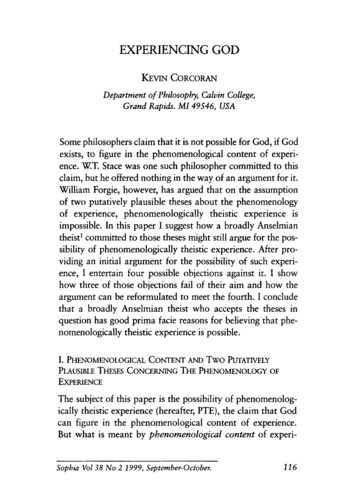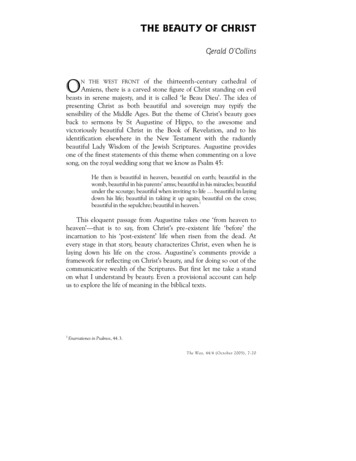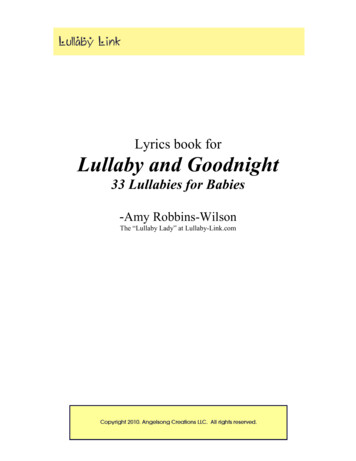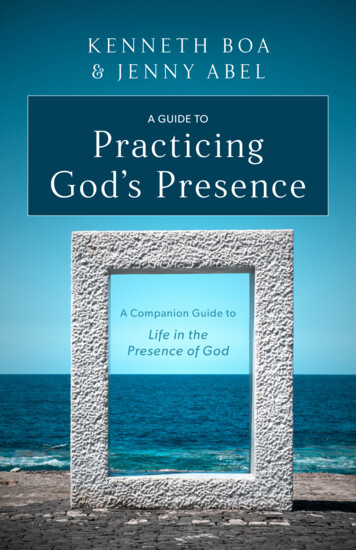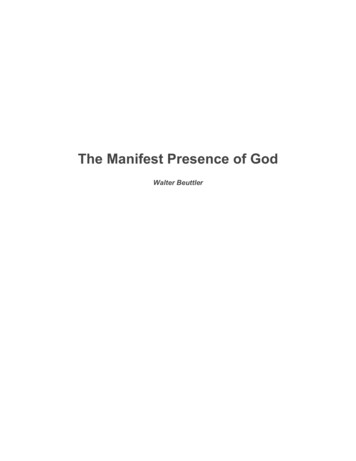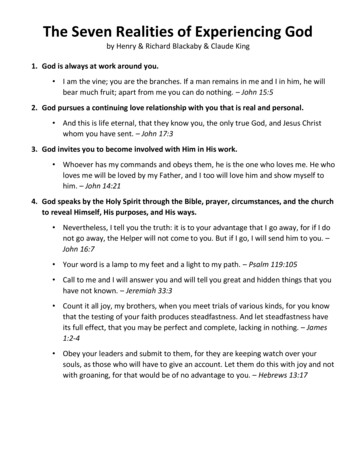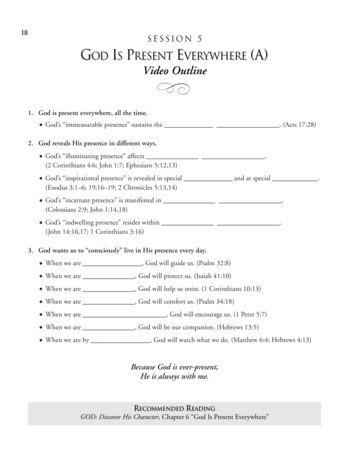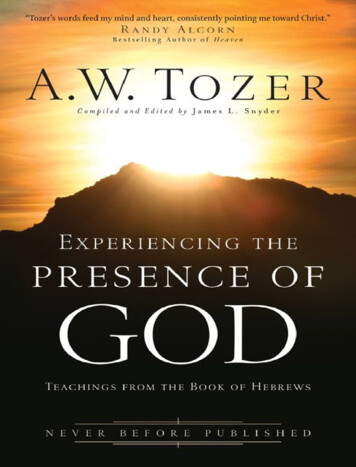
Transcription
EXPERIENCING THEPRESENCE OF GOD
A.W. TOZERCompiled and Edited by James L.Snyder
EXPERIENCING THEPRESENCE OFGODTEACHINGS FROM THE BOOK OF HEBREWS
Published by Regal From Gospel LightVentura, California, U.S.A.www.regalbooks.comPrinted in the U.S.A.All Scripture quotations are taken from the King James Version.Authorized King James Version. 2010 A. W. TozerAll rights reserved.Library of Congress Cataloging-in-Publication Data Tozer, A. W. (Aiden Wilson),1897-1963.Experiencing the presence of God : teachings from the book of Hebrews /A. W. Tozer; edited by James L. Snyder.p. cm.ISBN 978-0-8307-4693-4 (trade paper) 1. Bible. N.T. Hebrews—Sermons. 2.Christian and Missionary Alliance—Sermons. 3. Sermons, American—20thcentury. I. Snyder, James L. II. Title.BS2775.54.T69 2010227’.8706—dc2220100230191 2 3 4 5 6 7 8 9 10 11 12 13 14 15 16 17 / 20 19 18 17 16 15 14 13 12 11 10
Rights for publishing this book outside the U.S.A. or in non-English languages areadministered by Gospel Light Worldwide, an international not-for-profit ministry.For additional information, please visit www.glww.org, email info@glww.org, orwrite to Gospel Light Worldwide, 1957 Eastman Avenue, Ventura, CA 93003,U.S.A.To order copies of this book and other Regal products in bulk quantities, pleasecontact us at 1-800-446-7735.
CONTENTSForeword by Randy AlcornIntroduction: A Journey of Discovering God’s Presence1. Striving Toward God’s Presence2. Hindrances on the Pathway to God’s Presence3. Man Is Naturally Drawn Toward God’s Presence4. Our Personal Guide into God’s Presence5. Man’s Revolt Against God’s Presence6. The Nature of God’s Presence Among Men7. Finding True Freedom in God’s Presence8. Paving the Way into God’s Presence9. Enjoying the Manifest, Conscious Presence of God10. The “Sanctum Sanctorum” of God’s Presence11. The Dimensions of God’s Presence12. Our Mutual Fellowship in God’s Presence
13. The Threat to Our Delighting in God’s Presence14. Maintaining Our Spiritual Confidence in God’s Presence15. The Daily Practice of God’s Presence
FOREWORDAs a teenager and a brand-new Christian, one of my earliestand greatest discoveries was A. W. Tozer. From TheKnowledge of the Holy—still my favorite nonfiction bookbesides the Bible—to The Pursuit of God and Born AfterMidnight and his other books compiled from the editorials hewrote for The Alliance Witness magazine, I devouredeverything Tozer wrote.I still go back to those dog-eared pages and marvel at howChrist-centered, God-exalting and no-nonsense Tozer’s wordsremain. What do I mean by no-nonsense? Well, reading someof today’s Christian writers, I’ve been tempted to feel prettygood about myself. But reading Tozer is like asking for a muchneeded slap in the face! There should be a sticker on the coverwarning readers that they will be pierced by God’s Spirit. Andisn’t that exactly what we need in our noisy, thrill-a-minute,whatever-feels-good-is-okay culture?Tozer was not only a great thinker and Christ-lover but alsoa great writer who honed his literary skills as an editor andwriter of editorials. His eclectic knowledge is remarkable, andyet his style is concise and pointed. His words flow from ahigher source, out of his immersion in God’s Word and his owncommitment to worshiping God in everything. The result is apower that can at times leave the reader breathless, yet longingfor more.I am convinced that the evangelical Church in the Westernworld needs A. W. Tozer more than ever. That’s why I am so
grateful for this previously unpublished work Experiencing thePresence of God. What a pleasure to hear from Tozer on asubject of keen interest: God’s manifest presence in the life ofHis people. It is a much-needed wake-up call for anyone whowants to truly worship God. It left me enriched and challenged.Tozer is to me a mentor and an old friend. His timelessnessand impact on my life is comparable to that of Charles HaddonSpurgeon. Neither man has lost an ounce of his original powerand anointing, which was so firmly grounded in God’s Wordand the ministry of His Holy Spirit in their lives.Tozer’s words feed my mind and heart, consistentlypointing me toward Christ. By rubbing shoulders with him onthe pages of his books, I am led to worship God and am drawncloser to my Savior and King. There is simply no highercompliment I could pay an author.I thank God for A. W. Tozer, and I look forward to sittingnext to him at a banquet on the New Earth, where we will heardirectly from our Redeemer. My advice until then is simple:read this book and read everything by A. W. Tozer you can getyour hands on. In doing so, you will draw closer to Christ andinvest in the eternity that awaits us.Randy AlcornBestselling author of Heaven,The Treasure Principle and Safely HomeDirector, Eternal Perspective Ministries
INTRODUCTIONA JOURNEY OFDISCOVERING GOD’SPRESENCEThroughout the history of humanity, there have been manygreat discoveries. I am not sure which one we could point toand say, “That is the greatest discovery in the world.” But forthe hungry heart, there is but one discovery that satisfies it:the discovery of the manifest, conscious presence of God.This book you hold is an unveiling of Dr. Tozer’s greatestdiscovery: to understand what God’s presence in theChristian’s life is all about and to experience it. Dr. Tozer is aqualified guide in this pilgrimage.There are several things you will notice as you go throughthis book. First, everything that Dr. Tozer writes about is basedupon solid, scriptural truth. The major point he makes is thatone truth is not isolated from another truth. Isolating God’struth, according to Tozer, is how heresy starts in the Church.When people begin isolating Scripture to try to make itstand on its own, it is a warning signal that truth will besacrificed. It is possible to make the Bible say anything you
really want it to say. After all, the cults in the world begin withthe Bible, and what they do is isolate truth, failing to recognizethe harmony of the truth in God’s Word. Often, Dr. Tozer willsay something to the effect that it takes all of the Bible to makeit the Word of God.So the scriptural foundation is very important. Manypeople have taken a sharp left turn somewhere and gone intowhat Dr. Tozer calls a Christless mysticism. Nothing could bemore dangerous than this, which has led to a strange caricatureof Christianity in our day.I think the next thing you should look for in this book iswhat Dr. Tozer describes as the conscious, manifest presenceof God. Many people decry the word “experience.” However,unless you have experienced salvation, you have not beenborn again. And so the plea in this book is for each of us topress on and press in and experience the presence of God.Are there charlatans along this line? Of course. But wecannot allow some heretic to rob us of truths associated withthe Christian life. This basic truth before us is that it is possiblefor us to know God in a degree of intimacy that is progressiveas well as dynamic. The apostle Paul said, “That I may knowhim, and the power of his resurrection, and the fellowship ofhis sufferings, being made conformable unto his death” (Phil.3:10). That is the goal and what we are after: to know God in anincreasing level of intimacy from day to day.This book will whet your appetite for some of the deepthings of God. I think if Dr. Tozer were alive today, he might beshocked at some of the teaching we hear over the airwaves,especially on television. The deep truths of God’s Word are
not being expounded in our day on any large scale.That leads to another theme in this book. Tozer never goeseasy on what he refers to as religiosity, or, as the Scripturesays, “Having a form of godliness, but denying the powerthereof: from such turn away” (2 Tim. 3:5). One of the things heattacks most viciously is entertainment in the Church. If youare the sort of person who craves entertainment, you may notlike what you read. This message is for those who really wantto know God in a way that is out of the ordinary.A word of caution here: You might not always agree withDr. Tozer. In fact, he would not want you to agree with him oneverything. His purpose is not to win you over to his side. Wehave a tendency in our society to divide ourselves into littlereligious pigeonholes. Every little pigeonhole has to agree witheverybody on everything in that particular group. If you do notagree with everything, then you must go to anotherpigeonhole.Tozer thought this idea ludicrous. There are certainfundamentals of the faith to which we all must embrace andadhere, but then, as Tozer would muse, we must always allowroom for mystery. So many things in the spiritual realm remain amystery. Where we get into trouble is trying to define anddescribe all of the mysteries. Many of us have a SherlockHolmes complex when it comes to spiritual things. We want toknow everything to the smallest detail. This is nothing more orless than religious minutia, and it only feeds Pharisaic pride.Striving after God and aspiring to know Him are welcometraits. But in all of this, no matter how far we go in our spiritualwalk, there will still be mysteries. What Dr. Tozer teaches in
this book is how to walk in the mystery of experiencing God’spresence.Included at the end of each chapter is a carefully chosenhymn or piece of poetry that sums up the truth in that chapter.It would be well worth the effort to spend some time meditatingon that hymn or poem. Dr. Tozer’s practice in his daily walkwith the Lord was to spend time in the hymnbook. I know thehymnbook has gone out of style in many churches today, butwe cannot afford to miss the rare treasure of some of these oldhymns of the church!Dr. Tozer was not one to continually look back and pine forthe “good old days.” But neither was he dismissive of the greathistory of our Christian faith. And nowhere is that historyappreciated more than in the words of a good old-fashionedhymnbook. Perhaps his love of hymnody will whet yourappetite to explore this rich store of doctrinal truth.May God enable you in your spiritual journey to experienceeverything He has for you to experience. And may you comeaway from this book ready to live in the manifest, consciouspresence of almighty God.James L. Snyder
TEACHINGS FROM THEBOOK OF HEBREWS
1STRIVING TOWARDGOD’S PRESENCEGod, who at sundry times and in divers mannersspake in time past unto the fathers by the prophets,hath in these last days spoken unto us by his Son,whom he hath appointed heir of all things, by whomalso he made the worlds; who being the brightnessof his glory, and the express image of his person,and upholding all things by the word of his power,when he had by himself purged our sins, sat downon the right hand of the Majesty on high.HEBREWS 1:1-3In the deep recesses of man’s soul lies an overwhelmingyearning toward the Creator. This is a common thread throughall humanity, created in the image of God. Unless and until thatdesire is fully met, the human soul remains restless, constantlystriving for that which is ultimately unattainable.To any discerning Christian, it is easy to see that men andwomen are in an awful spiritual and moral mess today. A
person must know where he is before he can comprehendwhere he needs to be. The solution, however, is not within thescope of human endeavor. The highest ideal oraccomplishment of man is to break from the spiritual bondageand enter into the presence of God, knowing that you haveentered welcomed territory.Within every human breast rages this desire, driving himforward. Many a person confuses the object of that desire andspends his or her entire life striving for the unobtainable. Verysimply put, the great passion in the heart of every humanbeing, who are created in the image of God, is to experience theawesome majesty of God’s presence. The highestaccomplishment of humanity is entering the overwhelmingpresence of God. Nothing else can satiate this burning thirst.The average person, unable to understand this passion forintimacy with God, fills his life with things, hoping somehow tosatisfy his inward longing. He chases that which is exterior,hoping to satisfy that inner thirst, but to no avail.St. Augustine, the Bishop of Hippo, captured the essenceof this desire in his Confessions: “Thou hast created us forThyself and we are restless until we rest fully in Thee.” Thisexplains, to a great degree, the spirit of restlessness pervadingevery generation and every culture—always striving but nevercoming to the knowledge of the truth of God’s presence.John the Revelator voices something quite similar: “Thouart worthy, O Lord, to receive glory and honour and power: forthou hast created all things, and for thy pleasure they are andwere created” (Rev. 4:11). It is God’s great pleasure for us tofully rest in His presence, moment by moment. God created man
expressly for the use of His pleasure and fellowship. Nothing inor of this world measures up to the simple pleasure ofexperiencing the presence of God.The spirit of restlessness breaking across the sea ofhumanity testifies to this truth. Our whole purpose as createdbeings is to utilize our time delighting in the manifest presenceof our Creator. This presence is both intangible andindescribable. Some try explaining it, but only those with apersonal, intimate knowledge of God’s presence can trulyunderstand. Some things rise above explanation and humanunderstanding, and this is one. Many Christians are filled withgood information, but only a few mercy drops fall into theirlanguid soul to satisfy the thirst for God’s presence. Too manyhave never burst into the dazzling sunlight of God’s conscious,manifest presence. Or if they perchance have, it is a rareexperience and not a continuous delight.Man’s Striving for AltitudeIntimacy with the Creator separates man from all other of God’screation. The great passion buried in the breast of every humanbeing created in the image of God is to experience thisawesome majesty of His presence. However, several thingsstand in the way of man’s striving toward the presence of Godin personal, intimate familiarity.The experience of too many people trying to probe thepresence of God ends in complete and utter frustration.Longing to be in His presence and actually coming into Hispresence are two entirely different things. As created beings,man longs for the presence of the Creator, but in himself
cannot find it.Consider the eagle, born to fly. A natural yearning withinthe breast of the young eagle leads it to mount up on wingsand ascend into the sky with a thousand feet of clean airbeneath its wings. The eagle may, on occasion, walk on theground or perch in a tree, but everything about him is designedto fly in the air. If our eagle had its wings clipped, preventinghim from flying, he still would have the burning desire to mountup on wings and ascend into the sky. His ability, however,would be so impaired that he could never lift off the ground. Hecould not be true to his nature.Such is the plight of humanity. We are born to ascend intothe very environment of God’s presence where we belong; butsomething has clipped our wings, disabling us fromresponding to the cry from within. “Deep calleth unto deep atthe noise of thy waterspouts: all thy waves and thy billows aregone over me” (Ps. 42:7). Because man is shut out of thepresence of God, he suffers many maladies.Hindrances to God’s PresenceThe greatest hindrance, of course, is the fact that God isunapproachable. Sin has created an unmanageable debt for allhumanity. The good news, however, is that Christ has paid thedebt and bridged that gap to God for all. But there are still atleast three challenges that stand in man’s way as he strivesafter God’s presence.The Moral Bankruptcy of the Human Soul
The first obstruction is the moral bankruptcy of the humansoul. Man’s inevitable striking against the kingdom of God andthe moral order of the universe puts him in debt to that moralorder and becomes a debt to the great God who created theheavens and earth. This debt must be paid. What the moralconscience of all men requires and cries out for is a fund ofmerit sufficient to pay that debt. That’s why every religion triesto establish this fund of merit but without success.Religion does it through what is referred to as “goodworks,” resulting in emptiness and a deep-seated sense of guiltthat nothing can wash away. But even if such a fund of meritcould be achieved, it would not be enough. Pardon must besecured.What if some lowlife criminal desired to have an audiencewith the queen of England? Someone with a long-time record ofcriminal activity desired to stand before the gracious queenand be admitted into her presence.Such a matter could be arranged, because many have sodesired and been welcomed there. But something would haveto be done before that criminal could be admitted into thepresence of the queen. Nobody could arbitrarily admit acriminal into the queen’s presence—could admit someone whoby his previous acts jeopardizes the safety of her graciousmajesty and all that she symbolizes.Through the years, many have gone through the legalprotocol to prepare them for an audience with the queen. Theprimary ingredient for entering the queen’s presence wouldrest on a legal pardon. Somebody would have to straighten outall the legal issues necessary to grant a full pardon. The debt
would have to be paid. Pardon is a legal act beyond thecapabilities of the person being pardoned; it is an outside forceputting to rest the criminal’s past. That would be the first step.No criminal could capriciously come into the presence ofthe queen simply because he desired to do so. It would have tobe someone who was yielding allegiance; but that would notbe enough either. Even though the government could pardonthis man—could strike from the record all criminal countsagainst him so that there was nothing on the books—andrestore his citizenship as though he were a freeborn citizenonce more, even that would not go far enough.Now take this example of a criminal standing in thepresence of the queen of England and think about our desire toenter the presence of holy God. The human heart knows that itcannot enter into the presence of God, because it has rebelledagainst God. There must be something done to make it possiblefor that rebellion to end and be forgiven. The act of rebellionmust be pardoned completely, and the rebel restored to fullcitizenship in the kingdom of God, to be made a child of theFather.All of that was done in Christ. But that is still not enough.There is another hindrance.The Foul Scent of Sin Upon UsLet’s return to the example of a criminal wanting an audiencewith the queen. Although the man has been fully pardoned ofhis crimes, and his past has been expunged, that is not enough.Not only must the past be dealt with, but also the present mustbe attended to. He could not just walk off Skid Row, unshaven
and dirty, into the presence of the queen. He would also haveto be washed and made fit to stand in the queen’s presence.This pardoned man is dirty, smelly and unshaven. Before goinginto the presence of the queen, he would have to be groomedand cleansed and properly dressed.If he is to stand in the queen’s presence, his presentcondition and attire must be in complete conformity to herwishes and demands. She sets the standard, and all who comeinto her presence must conform to it. She never conforms totheir standard.In like fashion, man cannot enter the presence of God withthe foul scent of sin upon him. Although the past has beendealt with, the present condition also must be addressed. Thevery presence of sinful thoughts, for example, inhibits ourapproach into the presence of God. The filth clinging to ourrobe of self-righteousness repulses the pure, undefiledpresence of God. Not only do we need a change of heart, butwe also need a change of garment. Therefore, we mustexchange our filthy garment for the pure robe of righteousness.To come into the presence of God, we must conform in everyway to His standard.In light of this standard, some provision must be madeavailable. Some fountain must be opened in the House ofDavid for sin and uncleanness so that we may not only beforgiven but also cleansed. The blood of Jesus Christaccomplished this stupendous act! This is what Christianityteaches. This is the witness the Church gives to the world.Man’s moral conscience, crying for pardon and cleansingbefore the presence of the great God, has now found it by an
event, an act of the eternal Son, who is the image of theinvisible God and the firstborn of every creature, upholding allthings by the Word of His power (see Col. 1:15-17). He turnedaside to do this awful act—this awesome, amazing, stupendousact—by Himself. He single-handedly purged our sins. He alonecould do it, so He did it alone.In other things, Jesus Christ willingly accepted help. WhenHe was to be born into the world, He accepted the help of theVirgin Mary, who gave her pure body to God and brought Himinto the world—a man born a babe in Bethlehem’s manger. Hewept in her arms, nursed at her breast, was taken care of andfed and loved. He accepted the help of His mother. He willinglyaccepted help from Joseph, His supposed father, a simplecarpenter who worked from sunup to sundown to provideclothing and shelter for his wife and the boy, Jesus.But in this one area—the purging of man’s sin—the Sonoperated alone and single-handedly fulfilled all therequirements for man’s redemption. Therefore, the foul scent ofsin upon man can be washed and cleansed by the blood JesusChrist shed on the cross. This standard allows us to comeboldly into the presence of God.The Lost Concept of MajestyEven those in Christendom have been challenged in theirstriving after God. Not only our garments, but also ourattitudes and intentions need divine purification. We mustcome into His presence in a way that is worthy of Him.The present generation of Christians has suffered what Icall the lost concept of majesty. This has come about by a slow
decline, manifesting itself in our depreciation of ourselves.Those who hold a low value of man have a corresponding lowvalue of God. After all, God created man in His own image.When we cease to understand the majestic nature of man, wecease to appreciate the majesty of God. How did we get to thisplace?At one time, many believed the earth was the center of theuniverse and all the heavenly bodies revolved around it. It wasa simple earth and easy to explain, because we go by our sight,and by our sight the earth is still, and everything is travelingaround it. Most people believed this until the time ofCopernicus and Galileo, who came along in the sixteenthcentury and taught that the earth is not fixed at all, but inmotion around an orbit.For the most part, people complied with those findings andsaid, “Then, we’re all wrong about anything being fixed. Wedon’t believe in it anymore.” So they stopped believing therewas anything fixed in the heavens, or at least that the earth wasfixed.The common thought at the time was, “We’re riding aroundon earth’s diurnal course. If the earth is not the center of theworld, man is the center of God’s creation. Surely not only thecenter, but the top of God’s creation.” The accepted belief atthe time was that man is the top of the world; God made him,and made him in His image.In time, Charles Darwin came along and taught that man isnot the center, the head, the top and the final, finished productof the creation. Furthermore, the earth and all that is in it andon it is not a creation at all; it just happens to be here. It is
simply a moving purpose. Man is simply partway up fromwhere he used to be and where he is going to be. Man oncemoved about in colloidal ooze and crept and sloshed about inthe depths of the sea. Then the sun struck him and he took onan eye and became a mudpuppy. He moved some more, andafter the passing of a few more million years, he became a bird.Then after that, he became a monkey, and we are on our way,and here we are now. However, we are not where we are goingand we are not where we have been. We are not the center ofanything. We are simply taking off. We are in motion.About the turn of the twentieth century, or a little before,the world suddenly drew a deep breath and said, “Can itpossibly be that we are struggling upward and what used to becalled sin is not sin at all? It is something else. It is simply theresidual twitching of the old mudpuppy. The lingeringremnants of that which used to be in the man, and little by little,we are purging him out. Look at that baboon, and look at thatcollege professor. What an amazing difference! Look at him sitthere with a dreamy look on his face while he listens to aBeethoven symphony. See how far he’s come?”Yes, he certainly has come a long way. See him two nightslater when his wife bawls him out and he turns on her, shootsher, stabs her or walks out on her. He is a human being, too,and not all of his degrees have changed him on any level.In spite of all this, there were people saying, “Somewherethere’s something fixed. If it is not the earth, it is the sun.”About this time, Albert Einstein came along and said, “That isnot the way it is at all. Nothing is fixed anywhere, not even thesun. The sun is simply another star, and around it has gathered
the solar system, but that is not fixed either. It is movingaround another star farther out, and then that whole thing ismoving around another big one still farther out.”By this time, your head begins to ache, and you say,“Please, leave me alone. I can’t take this.” All of thesepostulations have served to take away every idea concerningthe majesty of man. You cannot believe any of these thingsand then look at a man with any respect.Look at the pictures of our founders and forbears—verydignified old gentlemen they are, but you cannot look on themwith respect if you’ve lost the sense of the majesty of manbecause God created him. You would see under their sideburnsthe marks of the mudpuppy gills. And you would realize theyare not dignified men made in the image of God at all but hadcrept up that far, out of the gutter.This is what this world system wants us to believe, takingaway all sense of majesty. You could not possibly respect thatwhich crawled up from below.A sense of majesty has been lost, and along with this asense of dignity has disappeared among mankind. This has sopermeated our society that it is perhaps beyond reclaiming.Even Christians suffer with a demoralized sense of majesty.It does not matter whether it is true or not as long as it isfunny. We do not care whether it is truth or not if it is said in acute way that entertains us.But I believe the Majesty is still in the heavens. ThisMajesty still sits on His throne before which angels,archangels, seraphim and cherubim continue to cry, “Holy,holy, holy, Lord God of Sabbaoth.” When Jesus, who was God
by Himself, alone purged our sins, He went back and sat downwhere He had been through the long, long ages—at the righthand of the Majesty in the heavens. After He sat down on thatright hand, the eternal Son turned to man.Reclaiming Our Sense of the Majesty on HighChristian leadership today has done so much to hinder themajestic elements of Christianity. Everything must have somekind of a logical, rational explanation. I readily admit that itverges on the impossible to describe in any degree ofadequacy the conscious, manifest presence of God. Any lameattempt on my part will crumble in frustrated disappointment.The best I possibly can hope is to put forth my personalexperience backed up by scriptural exhortation. My part is onlyto whet the appetite and then trust the Holy Spirit to take itfrom there.Many people like their religion in a nice neat formula—something they can do without much effort or thought. Thesedays everybody has some shortcut into the blessings of God’spresence: “Five easy steps to happiness” or “Ten easy stepsto get everything you want from God.” However, there is nonice neat formula for this. Rather, we need to whet the spiritualappetite for that which it truly craves: the presence of God. Iknow well that if you can explain it, it certainly is not themajestic presence of God.Most people, unfortunately, would pursue these pageswith a sense of curiosity and soon grow bored and turn asidefor the titillation of some new thing. Becoming fascinated withsome exterior trinket, they soon lose interest in pursuing the
presence of God. For those, someone always comes alongboasting of some new religious gadget to play with. The poor,undernourished, immature Christian goes from one religiousgadget to another, ending up with an emptiness inside thatthey cannot comprehend.This book is a small attempt to fan the flame of holy desiretoward God. I hope you will catch the passion and pressforward to delight in the conscious, manifest presence of God.Thomas à Kempis understood this and wrote, “If you are tolive an interior life you must learn to enjoy His intimacy,unhampered by any interruption from the world outside.” Heexpands this thought in his book The Imitation of Christ: “Fora man to make real spiritual progress, he must deny himself; aman who has made this renunciation enjoys great freedom andsecurity.”1Unfortunately, the world is too much with us, and it hassuccessfully become entrenched upon our inner soul, making itunable to court His presence. The good news is that the heartof man truly hungers for God’s presence and that all of thegreat barriers prohibiting that striving after God have beenovercome in Jesus Christ.God Is Present Everywhereby Oliver Holden (1765–1844)They who seek the throne of grace
Find that throne in every place;If we live a life of prayer,God is present everywhere.In our sickness and our health,In our want, or in our wealth,If we look to God in prayer,God is present everywhere.When our eart
The Daily Practice of God’s Presence. FOREWORD As a teenager and a brand-new Christian, one of my earliest and greatest discoveries was A. W. Tozer. From The Knowledge of the Holy—still my favorite nonfiction book besides the Bi


